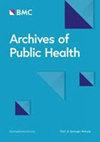20-59 岁人群的睡眠时间和睡眠质量与前期肌肉疏松症之间的关系:2005-2014 年全国健康与营养状况调查的证据
IF 3.2
3区 医学
Q2 PUBLIC, ENVIRONMENTAL & OCCUPATIONAL HEALTH
引用次数: 0
摘要
肌肉疏松症是一种肌肉骨骼疾病,其特征是肌肉质量、力量和性能显著下降。由于它主要影响老年人,因此通常被认为是一种老年病。然而,睡眠也与该病的发生密切相关。因此,探究 60 岁以下人群的睡眠与肌肉疏松症之间的关系,以制定预防肌肉疏松症的策略变得至关重要。在此,我们旨在利用大型人口样本,探讨非老年人群中睡眠时间和睡眠质量与肌肉疏松症前期的具体关系。这项研究涉及 7,187 名年龄在 20-59 岁之间的参与者,他们来自 2005 年至 2014 年间进行的美国国家健康与营养调查(NHANES)。根据体重指数(BMI)调整后的骨骼肌质量(ASM)来定义 "肌肉疏松前期"。自我报告的睡眠时间分为三组:8 小时(长时间睡眠)。睡眠质量根据睡眠障碍和失眠问卷进行评估。单变量分析和多变量逻辑回归用于研究睡眠时间和睡眠质量与前期肌肉疏松症之间的关系。睡眠质量与罹患肌肉疏松症的风险有明显关系(OR 1.72,95% CI 1.36-2.18,P 40 岁(P < 0.01)、非西班牙裔(P ≤ 0.01)、超重(P < 0.01)、收入较高(P < 0.01)、受教育程度较高(P ≤ 0.01))。此外,无论是否吸烟(P<0.01)、饮酒(P<0.01)、高血压(P<0.01)和糖尿病(P≤0.02),都与睡眠质量有关。在 20-59 岁的人群中,睡眠质量与前期肌肉疏松症风险的增加有关,而睡眠时间则无关。我们需要进一步开展大样本量的前瞻性队列研究,以确定因果关系,并制定有效的干预措施,预防 20-59 岁人群的肌肉疏松症。本文章由计算机程序翻译,如有差异,请以英文原文为准。
Association between sleep duration and sleep quality with pre-sarcopenia in the 20–59-year-old population: evidence from the National Health and Nutrition Examination Surveys 2005–2014
Sarcopenia is a musculoskeletal disease characterized by a significant reduction in muscle mass, strength, and performance. As it mostly affects older adults, it is often recognized as a disease of old age. However, sleep is also closely related to its development. Hence, it becomes critical to explore the relationship between sleep and sarcopenia in populations under 60 years of age to develop strategies for preventing sarcopenia. We here aim to explore the specific association between sleep duration and sleep quality with pre-sarcopenia in the non-elderly population using large population samples. This study involved 7,187 participants aged 20–59 years from the National Health and Nutrition Examination Survey (NHANES) conducted between 2005 and 2014. Pre-sarcopenia is defined based on the appendicular skeletal muscle mass (ASM) adjusted for body mass index (BMI). Self-reported sleep duration was categorized into three groups: <6 h (short sleep), 6–8 h (normal sleep), and > 8 h (long sleep). Sleep quality was assessed based on the Sleep Disorder and Trouble Sleeping Questionnaire. Univariate analysis and multivariate logistic regression were used to examine the relationship between sleep duration and sleep quality with pre-sarcopenia. Sleep quality was significantly linked with the risk of pre-sarcopenia (OR 1.72, 95% CI 1.36–2.18, P < 0.01). Longer or shorter sleep duration did not affect the risk of pre-sarcopenia, in contrast to normal sleep duration. Subgroup analysis demonstrated a more pronounced association in individuals who are > 40 years old (P < 0.01), non-Hispanic (P ≤ 0.01), overweight (P < 0.01), have a higher income (P < 0.01), and are more educated (P ≤ 0.01). Moreover, this association was noted in populations with or without smoking (P < 0.01) and alcohol consumption (P < 0.01), hypertension (P < 0.01) and diabetes (P ≤ 0.02). Sleep quality is associated with an increased risk of pre-sarcopenia, while sleep duration is not in the population aged 20–59 years. Further prospective cohort studies with a large sample size are needed to determine causality and develop effective interventions for preventing sarcopenia in the population aged 20–59 years.
求助全文
通过发布文献求助,成功后即可免费获取论文全文。
去求助
来源期刊

Archives of Public Health
Medicine-Public Health, Environmental and Occupational Health
CiteScore
4.80
自引率
3.00%
发文量
244
审稿时长
16 weeks
期刊介绍:
rchives of Public Health is a broad scope public health journal, dedicated to publishing all sound science in the field of public health. The journal aims to better the understanding of the health of populations. The journal contributes to public health knowledge, enhances the interaction between research, policy and practice and stimulates public health monitoring and indicator development. The journal considers submissions on health outcomes and their determinants, with clear statements about the public health and policy implications. Archives of Public Health welcomes methodological papers (e.g., on study design and bias), papers on health services research, health economics, community interventions, and epidemiological studies dealing with international comparisons, the determinants of inequality in health, and the environmental, behavioural, social, demographic and occupational correlates of health and diseases.
 求助内容:
求助内容: 应助结果提醒方式:
应助结果提醒方式:


